RED BANK – The stories of immigrants are our stories whose families had arrived generations ago. Their dreams are our dreams; their hopes for their families are the same as all of ours. They are America.
While on the national political arena, whether in the halls of Congress or on the campaign trail, the rhetoric gets fiery, with talk of building walls, rounding up undocumented immigrants, denying admittance to this country because of religious beliefs, there are many immigrants living in our area leading lives of quiet productivity, many operating small businesses. Their hope is, like many of us, to provide for their families, build a future and hope for better futures for their children. And in the process these small business owners are contributing to the local economy, offering services and goods, as well as creating jobs.
“I think it’s a great thing,” what these small business owners are doing, said Red Bank Mayor Pasquale Menna, a Democrat serving his third term.
Menna’s own background speaks of the immigrant experience. He came to the U.S. as a young child with his family from his native Italy. He recalled as a 10-year-old having to translate into Italian for his parents and while others “are looking at you telling you to speak English.”
Of the businesses owned and operated by immigrants, Menna said, “It empowers people of various minorities…By that empowerment they also have roots and have an invested stake in the success of that community.”
It can provide a protective barrier for their ethnic community. “And I think it’s a progressive tool,” Menna continued. “And I think it creates a level playing field where there were and still are abuses,” aimed at members of an immigrant community.
Here are are some of their stories:
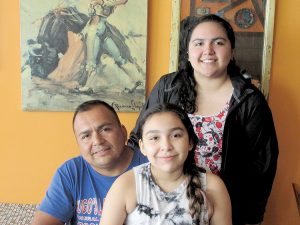
HUGO PAREDES
Hugo Paredes is a 44-year-old native of El Salvador. He traveled to the U.S. alone 22 years ago, knowing only a cousin who lived in this country.
“We came from a really poor country,” he remembered. Growing up “I got tired of seeing my mom working at the sewing machine day and night,” to support the family.
Along with being a poor country, El Salvador, in Central America, is a particularly violent one, Paredes pointed out, with gangs running rampant and a bloody civil war that had raged for years as he was growing up. His father became a victim of violent crime; attacked by a gang, shot four times and now is confined to a wheelchair.
When he first arrived, he didn’t speak any English, stayed with his cousin in Union City, then moving to Lynbrook, Long Island, working a variety of jobs – construction, produce clerk in a supermarket, dishwashing. He eventually made his way to Red Bank – where he met his future wife, Elizabeth – and found work with a Rumson landscaping company.
When the married couple who owned the landscaping business was divorcing and closing the business, they helped Paredes start his own landscaping company, providing him with equipment and about eight of their clients.
Paredes worked long hours and built up the business. He was able to put away enough money to open Rincon Latino, a grocery and deli, 218 Shrewsbury Ave., that markets to the Latino community. The work didn’t get any easier in the beginning, he said. Paredes would get up at 2 a.m. to travel to New York City or Philadelphia to purchase produce, get back, get the kitchen going in Rincon Latino for his wife to take over for the day, so he could start landscaping by 7 a.m. He would work until 7 p.m. or later.
Paredes also purchased an approximately 30-acre dairy farm, with about 70 cows, in his native country that family members operate.
For his businesses in this country, Paredes has about 20 employees working for him. And even though, “I had nothing” when he started, he said “life is good,” now for Paredes, his wife and two daughters and maybe in a few more years he’ll be able to slow down a bit.
He admits he has faced discrimination. “They don’t have to say it,” he said, but he could sense it in the way people looked at him. “They just start making faces.”
Paredes has become an American citizen and he takes exception to some of the comments from politicians. “We come to work; we don’t come to do bad things. We come to help the country, to help ourselves.”
He said coming to the U.S. is the “best thing to happen in my life.
“If you have ideas and you want something and are willing to work you can have it,” he believes that is what this country offers. “But you have to want to work.”
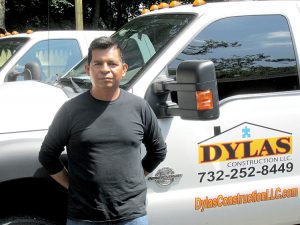
LAURO MORALES-FRANCO
Lauro Morales-Franco came to Red Bank from Mexico in 1999 because his brother and sister had already immigrated here. And when he arrived Morales-Franco took his brother’s advice: “He told me the first thing to do was to go to school to learn English.” So he took advantage of free ESL classes offered at Brookdale Community College’s satellite facility in Long Branch.
Before coming to the U.S., he considered staying in Mexico, having served in the Mexican Army. But attempts at business, such as a restaurant, were unsuccessful, in part because of the governmental bureaucracy he said he struggled against. “The life and conditions we had in Mexico, it was impossible to make anything,” to get ahead, he said.
Coming here, he began by working for a roofing company – starting his second day in the U.S. He went on to work in a number of area restaurants, including an Applebee’s, the Salt Creek Grille, Rumson, and the Americana Diner, Shrewsbury, and eventually found his way into construction work.
And that led him back into masonry work. Morales-Franco had begun working with concrete at 14 in Mexico, having left school to help his family. His family had eight children; “That’s a lot of mouths to feed,” he said.
A field manager on a construction site suggested Morales-Franco go into business for himself, given his ability in working with concrete. That led him to start Dylas Construction in 2005.
“In the beginning of business I couldn’t afford a truck; I had to use my car,” to lug equipment and material to the job sites. And now, 11 years later of owning a business, “Right now for me it’s the beginning of business,” as it continues to grow. “There’s no relaxing. I don’t see that right now.”
But coming here was the right thing, he believes. “I know if I stayed in my country it wouldn’t be the same. This country has more opportunity for everybody.”
He is studying to become a citizen and said the U.S. has been “wonderful,” allowing his family to live a life they wouldn’t have had in Mexico and helped him help his parents improve the quality of their lives.
“My wife says I dream too much,” he said, but the dreams he has now are for his children’s future. “I want them to get education, to go to college.”
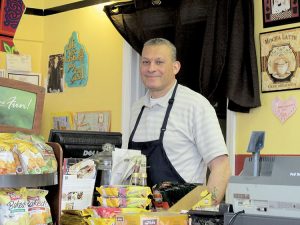
MOHAMED ELBERY
Mohamed Elbery has owned and operated Cafe 28 every day for the last 51⁄2 years. Every day. “Since I open I don’t have a day off,” as the lone employee of his small eatery.
But that’s OK, he maintains. “Yes, it’s paid off. It’s for yourself. It’s hard work, but it’s for yourself.
“You have to work hard in any business you’re in,” he added.
Elbery, 56, is an Egyptian who has had a varied career before settling in the U.S. He has a law degree, having worked as a lawyer in his native Egypt and served as an officer, as a criminal investigator, for the Egyptian Air Force. He always had a touch of the wanderlust and traveled through Europe, living in England, France, Switzerland, as well in Saudi Arabia and the United Arab Emirates. He owned and operated a jewelry store and worked for restaurants and hotels in his travels. “When I see the people traveling, I see the airplanes,” he explained, “it’s very attractive to me.”
In his 23 years of living in this country, the whole time living in Monmouth County, Elbery, who lives in Tinton Falls, has worked in restaurants and has sold cars before opening his eatery on Monmouth Street, which features Mediterranean and Middle Eastern fare as well as traditional western selections.
Business could be better – “It’s been slow, to be honest”– but “It’s been good,” in this country, he added. “I work for myself,” and for his wife and two children, a 23-year-old daughter and a 19-year-old son.
“It’s been hard work but it’s for yourself,” he said.
Life in America, he said, is “nice and quiet and steady and normal,” offering stability and security and a reassuring continuity. “Every day you know what it will be.”
He bristles at some of the comments he hears on the news. “They talk about what they want to talk about,” he said. “To be honest, when they push too much, yes,” it’s worrisome.
“This country is built from that,” the work of immigrants, he said.
“That’s everyone in America.”
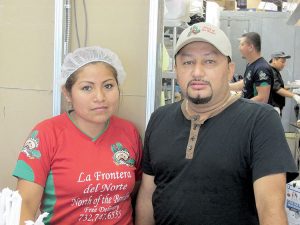
NELSON BELTRANENA
Nelson Beltranena, a 46-year-old native of El Salvador (and Paredes’ cousin), came to the U.S. in 2003, because of the crime and lack of opportunity he found in his homeland. “It’s the guns,” he said in stilted English, referring to the rampant violence, he witnessed. “Everyone is crazy.” He also felt, “The country wouldn’t let me work,” with its deplorable economy, he added.
Coming here, Beltranena worked for a time in restaurant kitchens and “I took what I learned” and opened North of the Border, a small, modest restaurant and take-out, 176 Monmouth St., in November 2009.
“Here, I can work and have my business,” he said.
Given the large and seemingly growing Mexican population, Beltranena felt that a restaurant specializing in Mexican cuisine was a solid business choice. And it has been, attracting a regular crowd of Latino customers. Now, though, “We want the Americans,” to come to his location.
He is planning to open his second location, with a North of the Border in Asbury Park with a planned opening next May. In his Red Bank restaurant, he currently employs ten.
Beltranena, who is a resident alien, and his longtime girlfriend have four children, ranging in age from 9-years-old to two weeks. For them “America is good. We can work. Everything is good.”
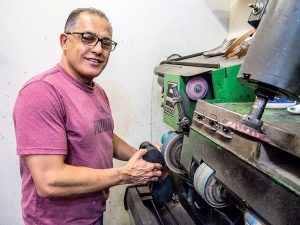
MARCO MACHADO
Marco Machado, who is now 50, came to the United States 32 years ago, and continued in the shoe repair trade that his father and grandfather had done to support their families in Machado’s native Brazil.
Machado, who lives in Perth Amboy, owns and operates Fernando’s Shoe Repair, 74 Monmouth St. where he is the sole employee. He has owned it for 15 years.
Machado decided to come to America “Like everybody: for a better life.”
“When I come here things were tough in Brazil,” with a declining economy, he recalled, precipitating his decision to leave. He had begun by working in construction, first living in Newark.
He is married with two daughters and said of his business, “I can’t complain. I make a living, pay my bills.”
But he had no reservations about what he thought of his adopted country. “I love America,” he said, noting he became an American citizen about 20 years ago. “Everything is good here. There is opportunity and security; you feel more secure here.
“There’s everything you need in the U.S.A.,” he added.
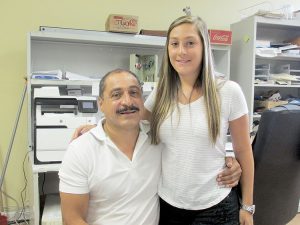
JUAN TORRES
Juan Torres came to the U.S. from his home in Mexico in 1982 and can be described as a success by any standard.
Torres, who is 55, and lives in Tinton Falls, has owned and operated Juanito’s Mexican restaurant, 159 Monmouth St., for nearly 25 years. He recently sold the second location, in Howell, which is still operating under the name Juanito’s II. He opened and runs a neighborhood grocery catering to the Hispanic community on Shrewsbury Avenue about four years ago; and has been operating a Latino bakery on the western end of Monmouth Street for about 12 years. Over the last four years he’s renovated four homes on the West Side and is renting them out.
His next endeavor is to build a laundromat with apartments on the upper floor in a vacant Shrewsbury Avenue building.
At one point, with the two restaurants and other interests he had about 60 employees, with that number now about 28.
Growing up in Mexico, Torres explained “Life was comfortable.” “But,” he added, “we wanted more.”
“I came to the United States for the opportunities,” he offered. Long days still, he acknowledged – “Every day, every day I come,” to the businesses – but he also conceded he’s slowed down a little since the early days.
The United States, “For me it’s great,” he offered. “The best country. The best country for opportunities.” Life here hasn’t always been easy, especially when he first came, acknowledging it’s a difficult transition to another culture and language. But he believes life is better now than if he stayed in Mexico, which he visits every year to see family. “There’s more freedom here more secure, safety. It’s better,” he said. “No complaints. I’m very happy, happy with my family.”
Torres, who became a citizen 12 years ago, has seven children from three marriages and for them “I want them to get an education, college.”
“There is no way you could make it with no college,” he advised. And he offered another lesson to his children and everyone: “To get where you want to be you have to work hard.”
“This nation is changing,” Menna observed, moving from what had been a majority white population to a more diverse, multi-racial and -ethnic country. “And I don’t think that’s a bad thing,” he added, with diversity bringing with it a vitality, he said.
And that change is continuing, as areas of New Jersey that had been predominately African American, or Polish or Jewish, had become Puerto Rican and then populated by other Hispanic nationalities as Mexican and Central American. And it’s still changing, “10 years from now it’ll be a different group,” probably taking on a Middle Eastern flavor as new immigrants relocate from part of the globe, Menna noted.














